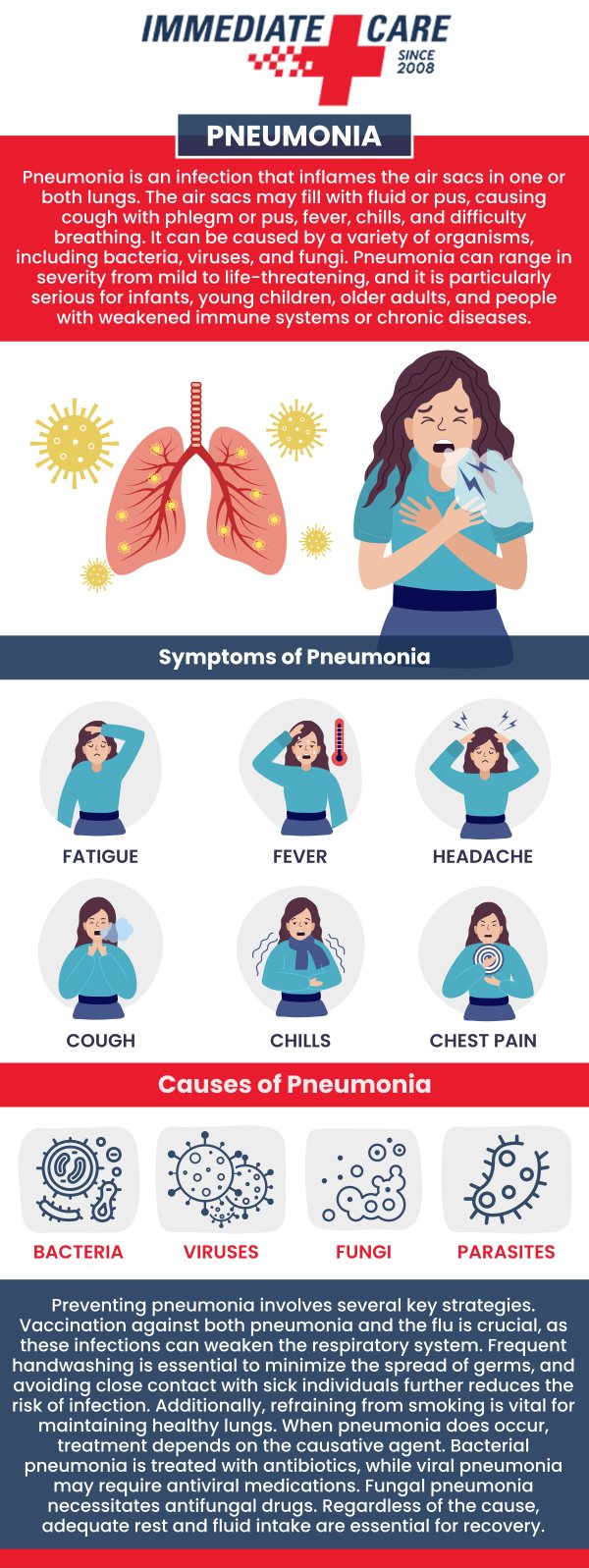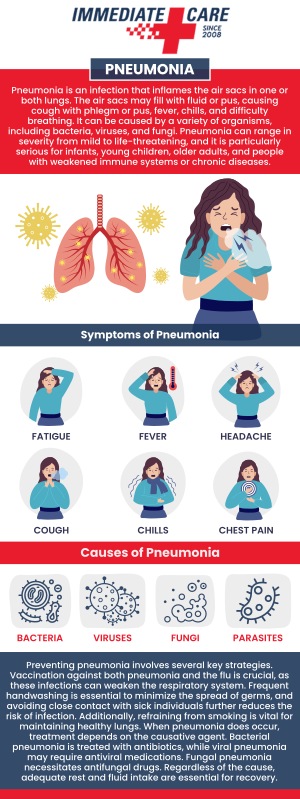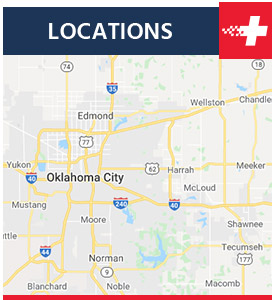Pneumonia Treatment Clinic in Tecumseh, OK
Pneumonia can start off feeling like a cold or cough, but can turn much worse if not dealt with. If you believe you are showcasing signs of pneumonia, contact our urgent care doctor today or schedule an appointment online.




Table of Contents:
What tests are done for pneumonia?
What are the 4 stages of pneumonia?
Can pneumonia damage the heart?
Pneumonia is an infection of the lungs caused by bacteria, viruses, or fungi, the severity of the condition varies. It is possible for pneumonia to develop as a complication of another infection, such as influenza or COVID-19. Your entire lungs may be affected or only certain areas may be affected.
There are five lobes in your lungs: an upper, middle, and the lower lobe on the right and an upper and lower lobe on the left.
In spite of the fact that pneumonia has many types based on the organism causing it, the disease is generally divided into two groups based on how much of the lungs are affected. The bronchi and bronchioles are the most common sites of bronchopneumonia. Air is brought into your lungs through these tubes. In the absence of effective treatment, this type of pneumonia often spreads to other parts of the lungs. Known as consolidation, lobular pneumonia affects an entire lung lobe and causes congestion or inflammation.
The doctor will begin by asking about your medical history and performing a physical exam, including listening to your lungs for abnormal bubbling or crackling sounds.
The purpose of a blood test is to identify the type of organism causing an infection and to confirm the infection. Nevertheless, precise identification isn’t always possible. X-rays help your doctor diagnose pneumonia and determine the extent and location of the infection. However, it cannot tell your doctor what kind of germ is causing pneumonia. Your blood oxygen level is measured by pulse oximetry. You may not be able to take enough oxygen into your bloodstream when you have pneumonia. During a sputum test, a sample of fluid from your lungs (sputum) is taken and analyzed to determine the cause of your illness. Other tests may be ordered as necessary to confirm the pneumonia diagnosis.
Typically, congestion occurs after a pneumonia infection has dominated one of your lung’s lobes. It typically lasts between 24 and 48 hours, and your lungs become inflamed, red, and heavy with infection. In the alveoli (the tiny air sacs of your lungs where carbon dioxide and oxygen are exchanged) of your lungs, you will see engorged blood vessels and swelling.
Pneumonia’s second stage is characterized by red hepatization, which lasts for a few days. A large number of immune cells accumulate around your alveoli during this time in order to fight off the infection. Lung tissue becomes dry and firm as strands of fibrous tissue replace swelling around alveoli. As a result, your alveoli cannot move oxygen and other gasses into your bloodstream. Under a microscope, the red blood cells that carry oxygen and nutrients can burst and leak, giving your lung tissue a pink or red appearance.
Gray hepatization typically occurs two to three days after red hepatization and may last up to eight days. The destruction of red blood cells increases fibrous tissue and secretions. Your tissues may accumulate hemosiderin, a protein that stores iron. On microscopic examination, these changes can stain or discolor your lung tissue, giving it a gray or darkened appearance.
By the time you reach the resolution phase, enzymes and other immune cells have mounted a defense against the infection and have been able to dissolve fibrous growths that restricted gas exchange. Dead tissue debris is cleared by immune cells called macrophages, and your alveoli begin to function again.
Inflammation throughout the body can be caused by pneumonia. As a result of this inflammation, bits of plaque can break free from your vessel walls, increasing your risk of heart attack or stroke.
Pneumonia can cause its own problems even if there is no existing coronary artery disease or plaque buildup. Several systems in your body, including your heart, can be affected by inflammation. Because of this heart failure is a common complication associated with pneumonia.
Pneumonia treatment is available at Immediate Care of Oklahoma.


Additional Services You May Need
▸ Urgent Care Services
▸ Illness + Injuries
▸ On Site Lab + X-Ray
▸ Helpful Health
▸ Motor Vehicle Accidents
▸ Drug Testing
▸ MRO
▸ UTI Treatment
▸ Employment Physicals
▸ Workers Comp
▸ Strep Throat Treatment
▸ Pregnancy Testing
▸ Blood Pressure Testing
▸ Urinalysis
▸ Mononucleosis Treatment
▸ Suture Removal
▸ Respiratory Syncytial Virus
▸ OccMed








